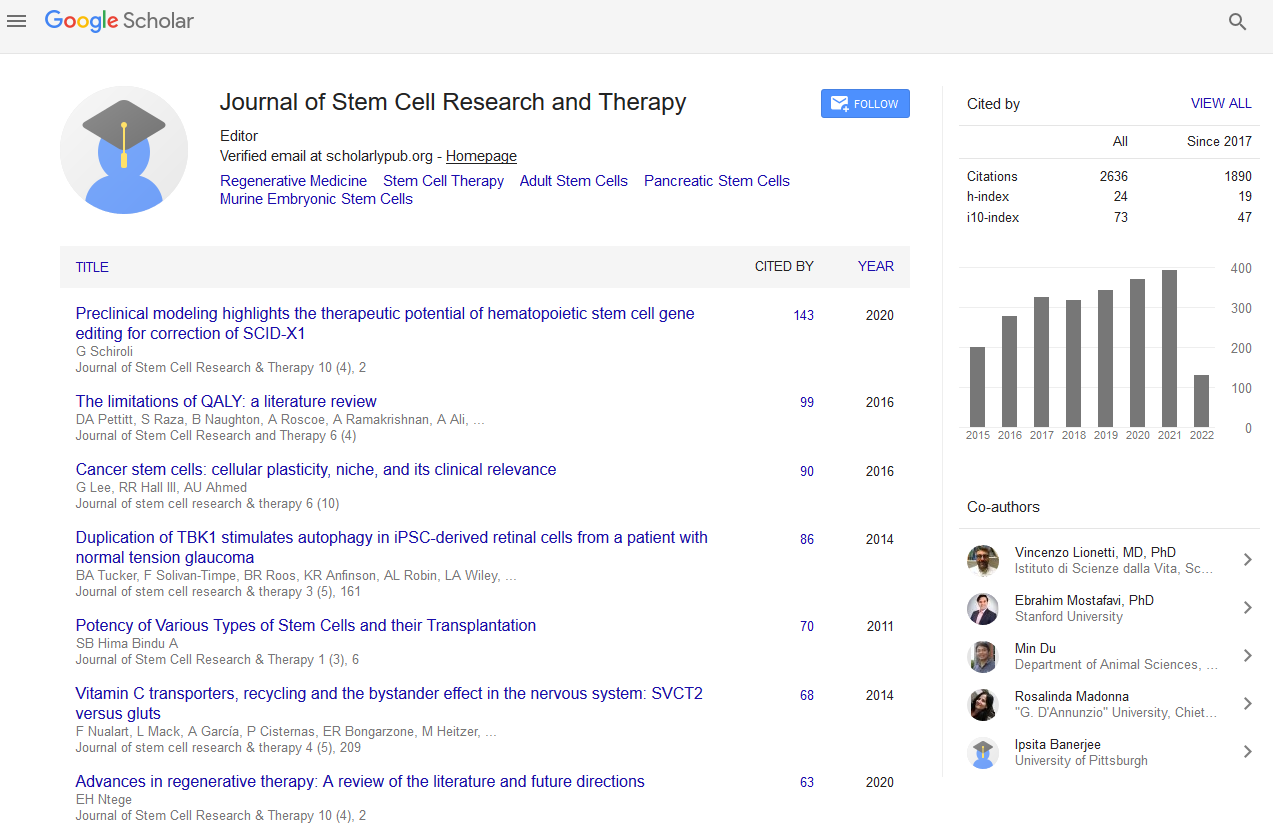Indexed In
- Open J Gate
- Genamics JournalSeek
- Academic Keys
- JournalTOCs
- China National Knowledge Infrastructure (CNKI)
- Ulrich's Periodicals Directory
- RefSeek
- Hamdard University
- EBSCO A-Z
- Directory of Abstract Indexing for Journals
- OCLC- WorldCat
- Publons
- Geneva Foundation for Medical Education and Research
- Euro Pub
- Google Scholar
Useful Links
Share This Page
Journal Flyer

Open Access Journals
- Agri and Aquaculture
- Biochemistry
- Bioinformatics & Systems Biology
- Business & Management
- Chemistry
- Clinical Sciences
- Engineering
- Food & Nutrition
- General Science
- Genetics & Molecular Biology
- Immunology & Microbiology
- Medical Sciences
- Neuroscience & Psychology
- Nursing & Health Care
- Pharmaceutical Sciences
Human Amniotic Fluid Stem cells (AFS): A novel resource for cell based therapy in regenerative medicine
International Conference on Regenerative & Functional Medicine
November 12-14, 2012 Hilton San Antonio Airport, USA
Liborio Stuppia
Scientific Tracks Abstracts: J Stem Cell Res Ther
Abstract:
Great attention has been recently devoted to stem cells obtained from amniotic fluid (Amniotic Fluid Stem cells, AFS), which represent an interesting model due to their unique features and the possible advantages of their use in basic research and regenerative medicine. AFS are known to express specific markers of pluripotency even at high passage numbers, to proliferate rapidly and to show a remarkable ability to differentiate into cells of all three embryonic germ layers. On the other hand, these cells do not form tumors when transplanted in nude mice. Due to these features, AFS cells are considered as a new class of stem cells with properties intermediate between embryonic stem cells and lineage-restricted adult progenitor cells, and could represent the gold standard for cell therapy, bringing together the differentiation capabilities of embryonic stem cells and the therapeutic safety of adult stem cells. Studies of our and other groups have evidenced that AFS cells have characteristics similar to pluripotent cells of the epiblast, since it has been hypothesized that during embryogenesis some cells have migrated from epiblast in AF. To verify this hypothesis, we investigated the ability of human AFS ceels to form in vitro three-dimensional aggregates, known as embryoid bodies, widely considered as an optimal starting point for the differentiation of pluripotent stem cells into three germ layers. Moreover, we have studied transcriptional profiles of genes abundantly and uniquely expressed in human embryonic stem cells and primordial germ cells as well as the expression of alternatively spliced genes implicated in development and differentiation and in particular in epigenetic mechanisms. Finally, the results of some preclinical studies carried out by using AFS as a cellular therapy for stroke in animal models will be discussed.
Biography :
Liborio Stuppia is full Professor of Medical Genetics at the ?G. d?Annunzio? University of Chieti-Pescara, Italya. He is Dean of the Faculty of Psychology and head of the Laboratory of Functional Genomics in the Aging Research Center of the same University. He is member of the Italian National Committee for Biosecurity, Biotechnologies and Life Sciences. Professor Stuppia has published more than 140 papers in reputed journals and is referee of several international scientific journals.


